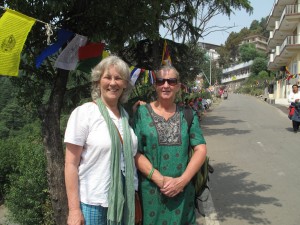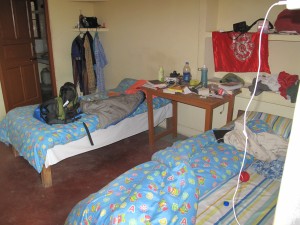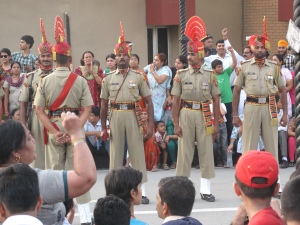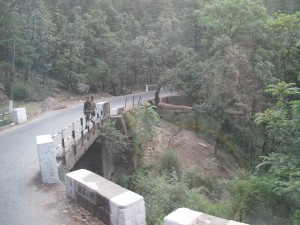
I knew the average age for an IVHQ volunteer is mid to late twenties, but I hadn’t expected older volunteers (people over fifty) to be such a rare breed.
Therefore I was delighted to bump into Rhonda, a gutsy fifty-five year old Australian, who has been volunteering in different parts of India for several years. I asked her how many older volunteers she had encountered during her travels.
‘One’, she said. ‘A woman in her sixties, and not one single older man.’
We both agreed this was a shame, and decided it could be due to a lack of information aimed specifically at this age group.
So, over a long cool Kingfisher beer, I asked Rhonda for any advice she would give an older person who might be thinking of signing up as a volunteer (although what follows is sound guidance for anyone planning a trip).
You have to get on with young people
‘First and foremost,’ said Rhonda, ‘as an older person you have to be able to get on with youngsters. I find them fun and refreshing, and I love their bubbly enthusiastic energy.’
‘I also enjoy the ‘mothering’ banter that goes on. Some of the kids get home sick, so I think they really like having an older woman around to chat to or to pour out their hearts when things get tough for them.’
‘The negative side is that these young people are at a very different developmental stage. I really don’t want to turn into their mother. So I tend to keep quiet when I find myself getting exasperated or annoyed.

This can be very difficult if you’re living in a hostel or sharing a room (normally the case). The noise levels can be intrusive to say the least. But I just remind myself that I was like this at their age.’
‘If something really upsets me – I don’t like swearing – I will say something. The main thing is to be adaptable, but I haven’t had any major problems that I can think of.’
‘I am used to being on my own, so I make sure I claim some space to myself by going for walks, or finding somewhere to meditate. That helps enormously. I also know that the placement isn’t forever. It’s an experience, and the youngsters I meet are part of the experience.’
‘Actually, I have formed some lovely on-going friendships with younger volunteers. This is something that would never happen at home.’
(You can ask for single accommodation in a home-stay if you don’t want to share a room or live in a hostel. This might not always be possible, but it’s certainly worth a shot.)
Research, plan your budget, and don’t forget how tiring travelling can be.
Rhonda always makes sure she does a lot of research before going anywhere.
‘Look at what kind of volunteering you want to do and link it with where you want to go and the interests you have.’
For instance, if you don’t like the thought of being the only westerner within miles, choose somewhere more accessible. You can always go on short trips to visit these places. You don’t have to stay there.’
‘Another important factor is budget. It’s much better to go for a shorter time and have the money to splurge out once in a while, than to go for a longer period where you are living on a shoe string and finding it really uncomfortable.’
I wholeheartedly agree with Rhonda about this. Treats like massages and occasionally staying in a nice hotel with clean sheets and a hot shower makes all the difference, especially when you’re feeling unwell.

And, don’t under estimate how exhausting it is to travel in developing countries. I love India but the relentless grime, noise, smell and heat coupled with the sheer volume of people speaking a completely different language can be overwhelming. So, give yourself time to acclimatise.
Be honest and keep in touch with home
‘It’s also important to be open-minded,’ Rhonda continued. ‘Older people can become set in their ways, and it can be difficult to adapt to different cultural practices and values.’
‘For instance, you may have certain ideas about how something should be done, but it might not be appropriate or feasible.’
‘It’s important to be honest with yourself, and honest with your volunteer co-coordinator if things aren’t working out for you. Volunteer organisations want you to have a good experience – word of mouth counts for a lot.’
‘Sometimes you just need to let off steam. This is when support back home is important. A skype call or an exchange of emails can quickly put things back in perspective.’
(I thoroughly agree with Rhonda about the importance of staying connected with friends and family back home. They will love to hear about your adventures as the days and weeks unfold.)
Your stomach!
‘You will probably suffer at some stage from a change of diet, if nothing else,’ said Rhonda with a wry smile. ‘Usually this settles down after a few days, but it’s important to be sensible about what you eat and where you eat it.’
‘To begin with, go to established cafes and restaurants frequented by other western travellers. Once you feel more confident try the street food. But always make sure you buy your drinking water for licensed shops – and make sure the seal isn’t broken.’
This is very sensible advice. Personally, I rarely, if ever, eat meat abroad. Just the sight of chickens cooped up in tiny cages on the road side next to a man with a machete and a chopping board is enough for me.
But I did get caught out once when offered tea by a friendly Indian shopkeeper. It arrived in the filthiest glass I have ever seen. Not to appear rude, I drank it. It took me three days to recover.
I am now very careful about what I accept from people, however well meaning. I also pour 4 to 6 drops of Citricidal (Grapefruit seed extract) into my water bottle. It is a natural antiseptic which helps to build up the immune system. It can also be used as a gargle, a face wash and it’s great for athlete’s foot and other fungal infections.
Health Insurance
‘Falling ill in a foreign country is an expensive business,’ warns Rhonda. ‘You must have a comprehensive health insurance policy in place, otherwise you’re going to get into serious trouble financially if anything does go wrong.’
‘You need to be aware that in some countries (India being one) people who help out in accidents are considered responsible for the person who has been injured. That could be an impossible expense for them.’
‘This is why a knot of watchers gather around the accident with no-one taking any action. It is usually other westerners who call the ambulance.’
‘It’s a case of being as careful and vigilant as you can be, without it getting in the way of enjoying your trip.’
(I always have a copy of my health insurance with me, and I also have photocopies of my passport and visa, just in case my passport goes missing.)
Working through organisations or independently
Rhonda has worked for volunteer organisations and has also set up her own volunteer projects so I asked her about the difference between the two.
‘It depends if you’re used to travelling or not, ’she said. ‘If you’ve never travelled on your own or you’re nervous about travelling alone, I would highly recommend working through a volunteer organisation.’
‘Normally, you are taken care of from the time you arrive at the airport until the time you leave the project. You are also automatically part of a group of people who you get to know pretty well, and you’ll be assigned a project coordinator who should regularly check in with you and make sure you’re okay.
‘Your home-stay will be organised for you, and, in most cases, you will be working for well established projects selected by the volunteer organisation. All you have to do is pay for your programme, then tip up and do whatever you have committed to.’
I would like to add that your home stay may be a challenge in itself. For instance, I am staying with a delightful Tibetan family in McLeod Ganj, but there is no running water, and it’s unlikely there will be during my three week stay.
Any water I use is from buckets, and that includes the loo. It is western styled, but I flush it by

pouring water into it. I don’t have a bedroom either. I sleep in one of the family’s living areas, and live out of my suitcase.
I don’t have a problem with any of this – I look at it as part of my adventures. But you need to be aware that you may be living with people who are impoverished and cannot even begin to provide the kind of home comforts that you are used to.
Sorting it out yourself
Rhonda admits that it’s a big step to sort out your own volunteer programme, but she enjoys the freedom and challenge of it.
‘In my experience most developing countries are crying out for volunteers, so you could jump on a plane and head for somewhere you want to visit and pick up work while you’re there. I’ve done this quite a few times.’
‘But you can find yourself working with projects that have very little funding, and end up staying in some pretty strange places. It can be quite lonely too, especially if you’re in a very rural location.’
‘If you want to do your own thing, the main thing to remember is that you are completely dependent on your own resources, and it’s important stay calm when problems arise.’
I asked Rhonda to sum up what it means for her to work as a volunteer.
‘For me,’ she said, ‘life is about taking risks. It’s about pushing those boundaries, and stepping out of your comfort zone once in a while. That’s what keeps me going. Volunteering means you get to meet wonderful people, see beautiful places,and do extraordinary things. It makes life very rich and rewarding, and it helps me stay young at heart.’

I couldn’t agree with her more.








1 comment
The 40 Year Old Student
You fabulous adventurer! Glad you’re enjoying yourself. Lots of love xx